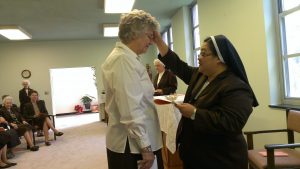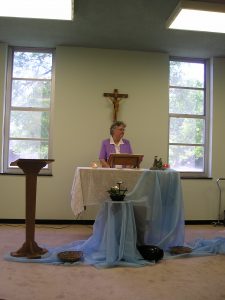 When I was in sixth grade, my teacher, Sister Mary Helen, said to my class: “You are now old enough to start thinking seriously about what you want to do with your life.” “Well,” I thought,” I have one life. God is the highest good. So I will give my life to God.” It seemed so clear to me. And for me it meant that I would become a sister.
When I was in sixth grade, my teacher, Sister Mary Helen, said to my class: “You are now old enough to start thinking seriously about what you want to do with your life.” “Well,” I thought,” I have one life. God is the highest good. So I will give my life to God.” It seemed so clear to me. And for me it meant that I would become a sister.
When I was near finishing high school and began planning to enter the convent, I met an obstacle. My dad was a Lutheran, and in the pre-Vatican II days, Catholics and Lutherans had a mutual antagonism and suspicion of each other. In fact, when my dad was small, his mother would threaten to send him to the nuns if he wasn’t good. He had grown up hearing horror stories about convents and what when on. So a battle of wills raged. Finally he took back his threat to get a lawyer to get me out but said that if I entered the convent, I would never see him again.
Thus the day my mother drove me to the convent was one of great sadness. I left my beloved dad with tears in his eyes. It was also one of great joy because I was about to begin my dream. I was going to find truth, love, and goodness. I quickly met reality. I found a group of women with human foibles and faults, seekers as I was and only on the way. Nevertheless, I felt I was where God wanted me to be. (It took a couple of years, but my dad relented and eventually came to be glad for me.)
My first ministry was teaching high school at Mount Carmel Academy: religion, math, chemistry, debate, home room. What a joy! For me, teaching is not merely something I do. I am a teacher. I have been given the gift to see and to be able to articulate what I see in a way that makes sense to people. Then they can say, “Of course, I knew that. I just never put it that way before!”
Besides teaching high school, I have taught the young women who came to join us about religious life and spirituality. I have taught in renewal programs for priests and religious. I have been involved in spiritual companioning and retreat work. My main mission is to help people become aware of their own desire for God which has been implanted in each of us by our Creator, and to respond in love to the love that has been showered on us.
Another important call within the call occurred when I was a junior in high school. My mother had given me money and sent me to Central Grocery in the French Quarter to buy a special kind of pasta for a party she was giving. I drove downtown with a couple of friends. We were walking to the grocery when I saw an old black woman shuffling along the sidewalk. She had no shoes. I was struck by the incongruity, the inequality, the injustice of me having money for a special kind of pasta and her having no shoes. I wanted to take my shoes off and give them to her, but I hesitated. I was embarrassed to do this in front of my friends. (It is something I regret.) But this was the start of a desire to work among the poor, black people of New Orleans that later bore fruit.
After working for several years in formation ministry in my congregation, I made a 30 Day Retreat in the Jesuit tradition. As part of the retreat, I prayed for not only a poverty of spirit, but authentic poverty, if it was God’s will. When I returned, I began a search which led me to two sisters of Mercy who were living and working in the St. Thomas public housing project. I joined them, living in an apartment in the center of the project, and working at Hope House, a ministry on the edge of the project. We did pre-school, GED, direct services, community organizing, a newspaper called Flambeau, and workshops for justice for parishes and high school groups. For these workshops, we had our neighbors who lived in the project tell groups who came to Hope House of their lives. In particular, different folks would express how the systems of our society: education, health care, criminal justice, economics, religion, were for them. Those who came from the suburbs often did not have the capacity to even imagine what the folks experienced as their own experience was so different.
I always remember one lady in particular, Miss Ruby. She would tell of her life, beginning with cooking in a house where her mother worked as a maid. Ruby was so small she had to stand on a crate to reach the stove. She told of other tragic events that she had endured. Many times, someone in the group that was listening would ask, “If your life is as it is, how can you believe in God?” Ruby would answer simply, “Because my life is as it is, how can I not believe in God? God is my strength, God is my hope, God is all I have.” My seven years in St. Thomas have stayed with me as a particularly grace-filled time. I felt that I was at the center of the world, where the difficulties we helped people with were so essential. All triviality was gone.
I left St. Thomas when I was elected vice-president of the Congregation and moved to our property in rural Lacombe. I missed the city, but learned to love the beauty of nature I encounted there. We began a nine-month renewal program for religious and clergy from around the world. Blessing Place was a holistic program with a wonderful staff which integrated the deep wisdom of the spiritual tradition of the Catholic Church and Carmelite spirituality with the wisdom of the 12 Steps and wholistic health. We had lectures, pottery, art and prayer, massage, community life, group therapy, social outings, Mardi Gras celebrations. For thirteen years, I felt I was able to use gifts God has blessed me with in a full and rich way.
Then 9/11 happened and our foreign participants had trouble getting visas. And I developed cancer. The powerlessness I experienced in the midst of chemotherapy, radiation, and multiple operations brought me to a new place, an experience I could not even have imagined before of God’s support and care when I myself had nothing left.
Today I am director of the Carmelite Spirituality Center giving retreats, spiritual guidance, and creating a milieu in which people can search for and discover God-with-us. I am also director of On-Going formation for our congregation. Each year I provide materials to our sisters for our on-going reflection and prayer on Carmelite spirituality, social justice, and the signs of our times.
A blessing I have received is to be care-giver for a one of our sisters, a dear friend with Alzheimer’s disease. I treasure the moments when she is behind her eyes and the love which no disease can touch.
I continue to learn. Life has been my great teacher. My religious vocation, my life in community, the call to prayer and contemplation that are essential to the Carmelite way have helped me to be open to life and hopefully, to learn the great lessons I have been presented. After more than 50 years in religious life, I can say: I am a Carmelite. I am a follower of Jesus Christ. And what I desire with all my heart is to be, through the kindness of my Creator and the power of the Holy Spirit, another Christ in my time and my world.
